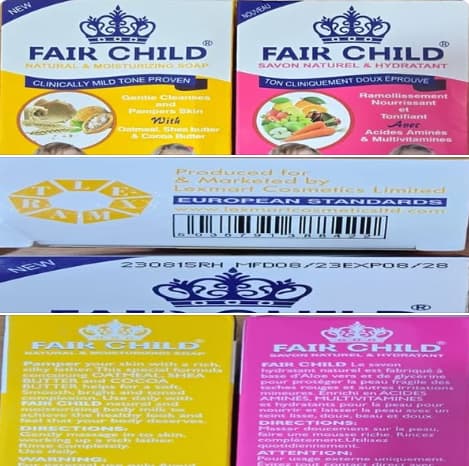The National Agency for Food, Drug Administration and Control (NAFDAC) in Nigeria has issued a critical public alert concerning the circulation of an unregistered skin-lightening product named “Fair Child Soap,” specifically marketed for use by children. The discovery was made during routine post-market surveillance operations conducted in retail outlets across Lagos, revealing the product’s unauthorized presence in the Nigerian market. NAFDAC emphasized that the soap’s deceptive labeling and unethical marketing practices pose significant health risks, particularly to minors, prompting urgent regulatory action to protect public health.
The issue came to light following a formal complaint lodged with NAFDAC regarding the unethical promotion and distribution of skin-lightening products targeted at children. The complainant highlighted concerns about the increasing use of such products among minors, driven by misleading marketing that promotes unrealistic beauty standards and potentially harmful cosmetic practices. NAFDAC’s investigation confirmed that Fair Child Soap, an imported product with plans for local manufacturing by Lexmart Cosmetics Ltd., lacks proper registration, violating Nigeria’s regulatory standards for cosmetics and posing a serious threat to consumer safety.
Fair Child Soap’s labeling has been identified as a major concern due to its misleading claims and failure to disclose critical information about its ingredients. NAFDAC warns that unregulated skin-lightening products may contain harmful substances, such as hydroquinone, mercury, or potent corticosteroids, which are often banned or restricted due to their toxic effects. In children, whose skin is more sensitive and still developing, exposure to such chemicals can lead to severe dermatological issues, including skin thinning, hyperpigmentation, irritation, and increased susceptibility to infections.
The health risks associated with Fair Child Soap are particularly alarming given its target demographic of minors. Prolonged use of skin-lightening products can disrupt the skin’s natural barrier, leading to long-term damage such as uneven pigmentation, scarring, or even systemic health issues if toxic substances are absorbed into the bloodstream. NAFDAC underscored that the unethical marketing of such products exploits vulnerable populations, including children and their caregivers, by promoting harmful beauty ideals without adequate warnings about potential adverse effects.
NAFDAC’s regulatory framework requires all cosmetic products, including soaps, to undergo rigorous safety assessments and registration before being sold in Nigeria. Fair Child Soap’s failure to comply with these regulations renders its distribution illegal, prompting the agency to initiate a nationwide recall of the product from retail shelves. The agency has also directed Lexmart Cosmetics Ltd. to cease all plans for local production until the product meets stringent safety and labeling standards.
In response to this issue, NAFDAC has intensified its surveillance efforts across major markets and distribution channels to identify and confiscate stocks of Fair Child Soap. The agency is collaborating with other regulatory bodies and law enforcement agencies to ensure that distributors and retailers comply with the recall directive. NAFDAC has urged the public, particularly parents and guardians, to avoid purchasing or using the product and to report any sightings to the nearest NAFDAC office for immediate action.
The agency has also issued a broader warning about the dangers of unregulated cosmetics, emphasizing the need for consumers to verify the authenticity of products before use. NAFDAC advises checking for the agency’s registration number on product packaging, as this indicates compliance with safety standards. Consumers are encouraged to prioritize products from reputable manufacturers and to be cautious of cosmetics with exaggerated claims, especially those targeting vulnerable groups like children.
To address the ethical concerns surrounding the marketing of skin-lightening products, NAFDAC is planning to engage stakeholders, including manufacturers, marketers, and community leaders, in awareness campaigns. These initiatives aim to educate the public about the risks of skin-lightening products and promote healthier, safer beauty practices. The agency is also reviewing its regulatory guidelines to strengthen oversight of cosmetics marketed to minors, ensuring that such products undergo additional scrutiny to protect young consumers.
NAFDAC’s alert on Fair Child Soap underscores the broader public health challenge of combating the proliferation of unregulated cosmetics in Nigeria. The agency’s proactive measures reflect its commitment to safeguarding public health, particularly among vulnerable populations. By addressing both the immediate threat posed by Fair Child Soap and the systemic issues of unethical marketing, NAFDAC aims to curb the circulation of harmful products and foster greater consumer awareness.
The public is urged to remain vigilant and report any suspected unregistered or harmful products to NAFDAC via its toll-free hotline or online reporting platforms. Healthcare professionals, including dermatologists and pediatricians, have been advised to monitor and report any adverse reactions linked to the use of Fair Child Soap or similar products among their patients. NAFDAC’s swift response to this issue highlights its ongoing efforts to uphold regulatory standards and protect Nigerian consumers from the dangers of substandard and hazardous products.




